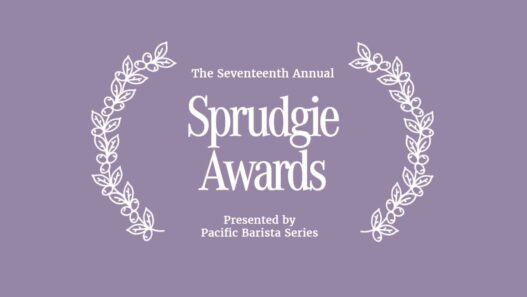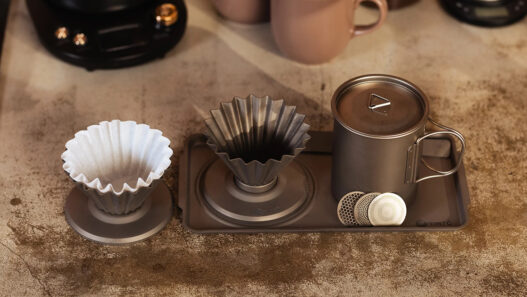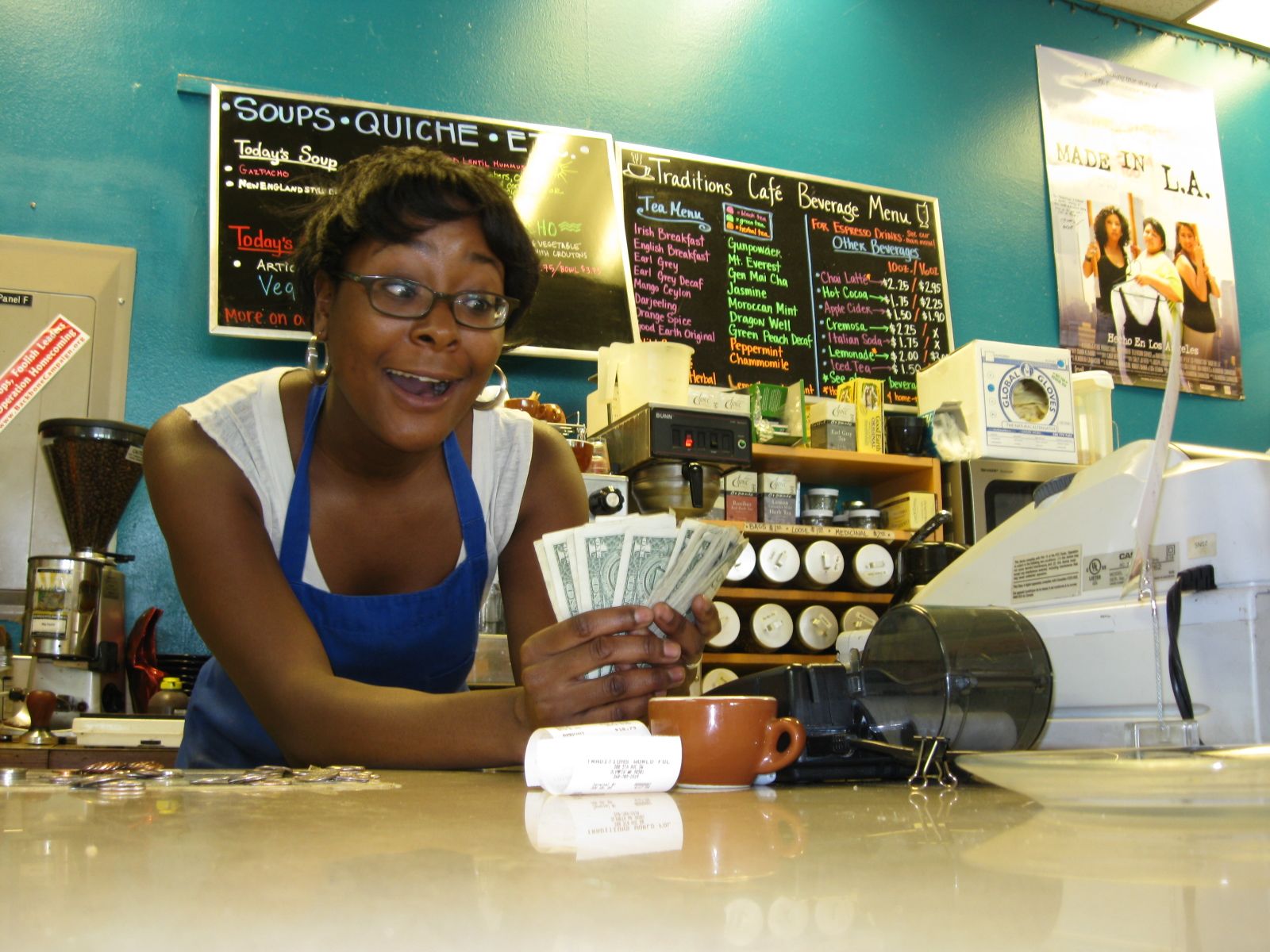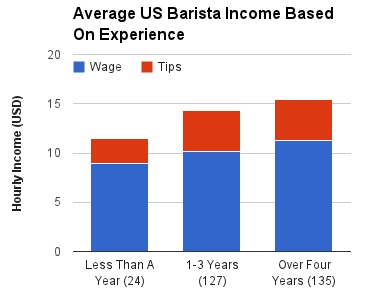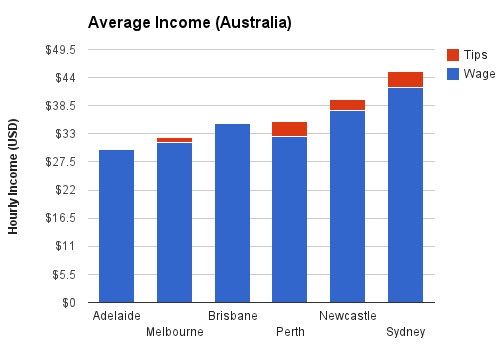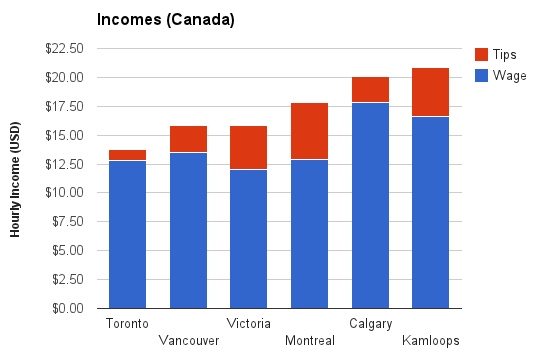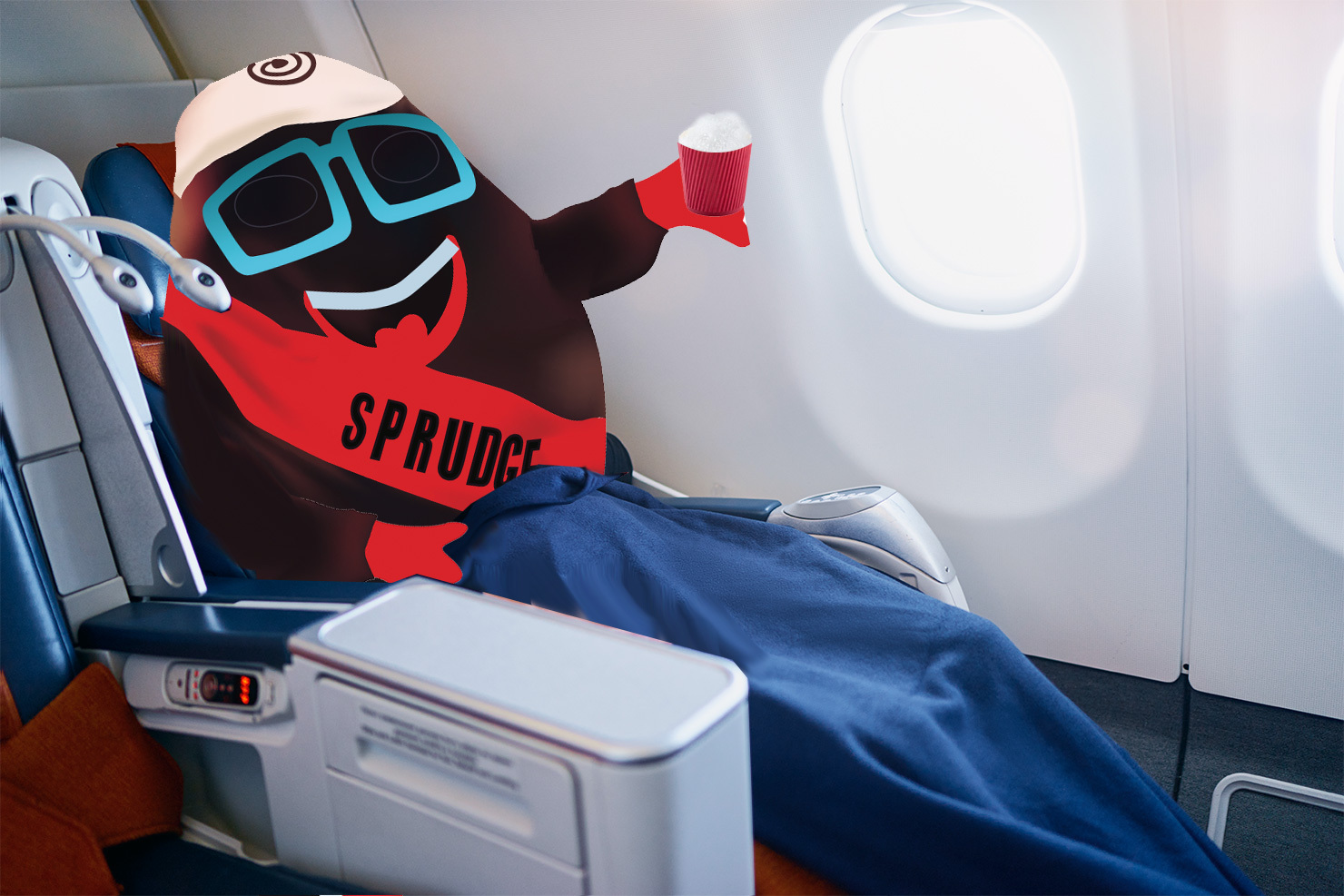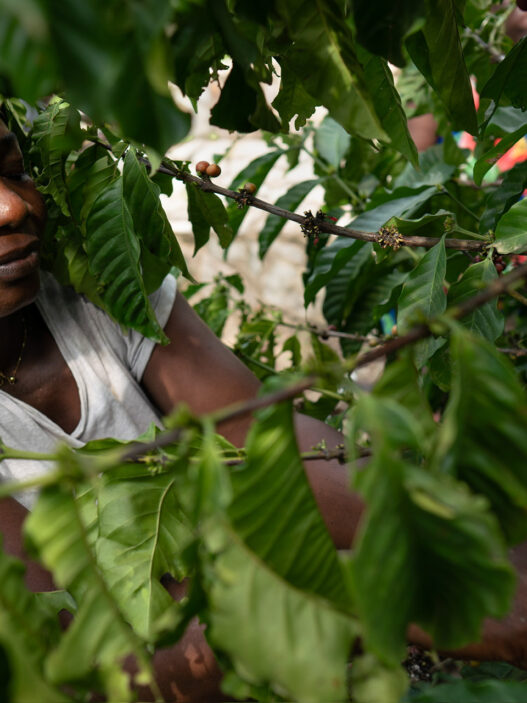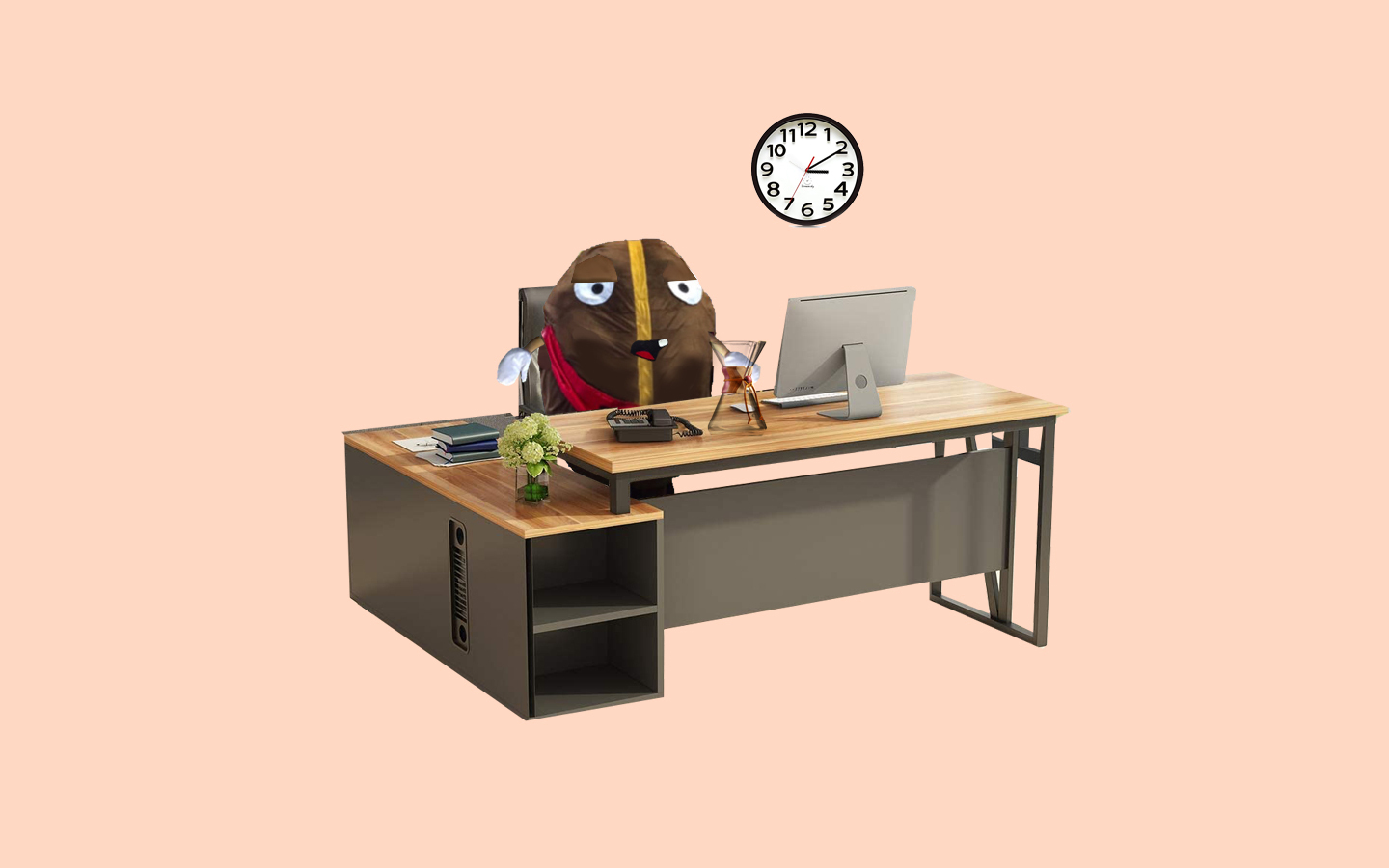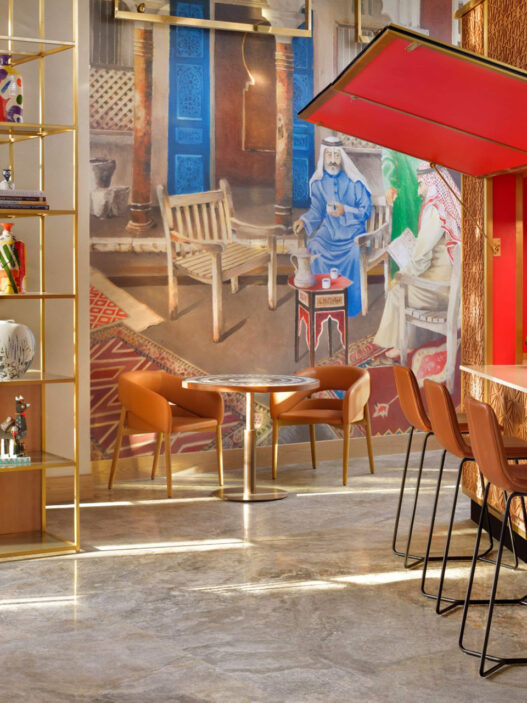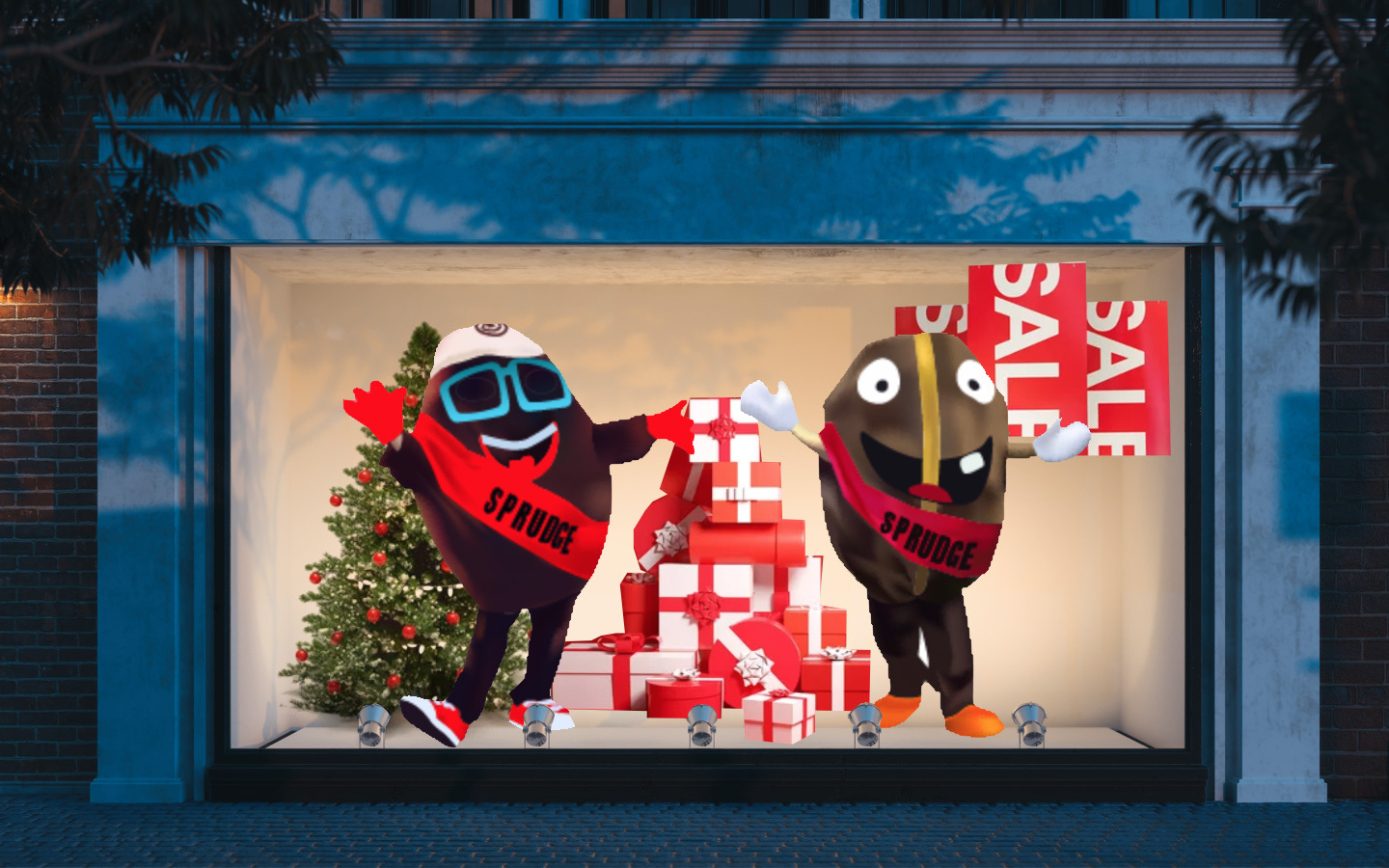You may have heard a thing or two about how people work in coffee for the love of it. But we all gotta get paid too. You may also have heard a bit about this whole “professional jobs in coffee” thing, which is definitely happening, but the truth is the vast majority of people working in coffee are still doing so as a barista. Last month, in the heat of our USBC / SCAA Boston coverage, Sprudge.com put together a little survey to get a sense of what people are making working as a barista, and now we want to share the results with all of you.
We’ve got a whole heap of graphs and infographics to break down the info, and we’ll start with results from some of our international readers. Click the graphic to enlarge.
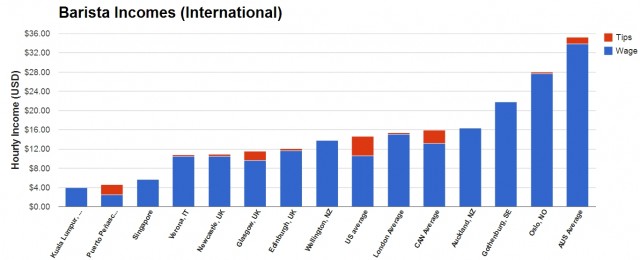
A few things we learned: Aussie baristas are getting paid, we have at least one reader in Kuala Lumpur, and London baristas sure aren’t making a lot of money for how expensive their city is.
Before we start delving more into the numbers though, here’s a bit of background. These results are based on 350 total respondents, 286 of whom were from the US. All numbers have been converted to US Dollars, and an assumed average shift length of 7 hours was used to calculate tips/hour. Any number marked as an “average” represents at least four individual responses. No adjustments for cost of living or taxation were made.
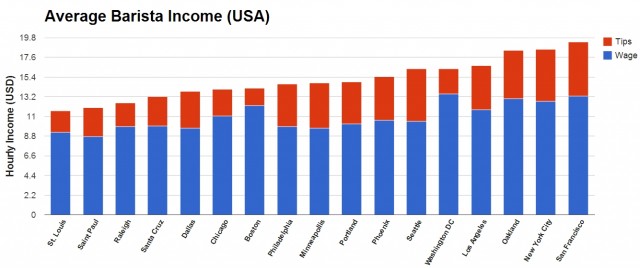
Wage is the biggest component of a barista’s income across all countries, though unsurprisingly it makes up the second smallest percentage of income (72%) in the United States. Wages variy pretty heavily based on cost of living in different cities, especially in relation to the level of tipping, which helps to explain the high wages in Boston, Washington DC, and of course non-tipping cultures like the UK.
Looking at the breakdown of US income based on experience, we can see that wage is the principal determinant in income differences between baristas with 1-3 years experience and those with over 4 years of experience. There appears to be a significant overall income pay-off for having over a year’s experience, but relatively little for having more than 3 years experience. The exception to this is found at the very top end: the highest wage and third highest overall earner in our survey was a barista in New York City with over 4 years experience; he or she is making $25/hr salaried. The 2nd and 3rd highest wages go to baristas with over 4 years experience who are making $20/hr salaried in Los Angeles, CA and Chicago, IL.
An interesting note about the already stupendously high wages in Australia is that Australian law requires employers to contribute an additional 9% of a worker’s wage to a retirement fund, making Australian baristas’ overall incomes even higher. I’m super curious as to what explains Australia’s much higher barista incomes—higher prices? higher volume? combining coffee with other offerings? Obviously, the cost of living explains some of it, such as the astronomical average income of $44.15/hr in Sydney, but that can’t be all of it. If you find yourself in Melbourne for WBC, ask some Aussies how they support such high barista wages. You can email your findings to AussieBling@Sprudge.com for a follow up to this feature.
Based on the robustness of its specialty coffee scene and its high cost of living, I’m not surprised that San Francisco has the highest US average income in this survey, but Oakland is an interesting anomaly. Theoretically, the cost of living is much lower there, but the highest-earning individual respondent in our survey is a barista in Oakland making $15/hr in wage, plus another $13.5/hr in tips. Oakland also has a barista in the top five wage earners at $16.5/hr + $5.75/hr tips. Perhaps these respondents live in Oakland but work in SF, or maybe some of the cafes in Oakland are really just balling that hard.
In the US and Canada, the level of tipping is hugely variable across cities. The highest tip earner in our survey is a barista with 4+ years experience in NYC who receives ~$14.25/hr on top of their $11/hr wage. Number two is our friend in Oakland making $13.5/hr +$15/hr wage, followed by a barista in Nashville, TN making $10.71/hr + $7.5/hr wage. Another New Yorker reported in at $10/hr + $13/hr wage, and our top 5 is rounded out by a San Franciscan making $10/hr + $13.25/hr wage.
I’ve worked bar in Seattle, Portland, Boston and New York. Based on that experience, I was a little surprised that Seattle made only one appearance in the top 10 list for tips with $9.28/hr, despite tips in Seattle making up the highest average percent of income of any city at 35%. In my experience, the high-end of tips in Seattle may not be great, but tipping is obviously a cultural value: Seattle was #3 for average tips at $5.85/hr. I was much more surprised that Portland’s first appearance on the top tips list was at #49 with $6.40/hr, and the average tip-out there was very middle of the pack at $4.69/hr. I was not at all surprised that Boston had they lowest average tips at $1.93/hr, making up only 13% of total income. Most interesting for me though was the fact that New York was #2 in average tips with $5.86/hr.
One explanation of these surprising tipping findings may be the question of volume. I would have guessed that New York would be way lower on the tipping ranking because (based only on my personal impressions) the average per customer tip here seems to be $0.25-$0.50, while in Portland and Seattle it seemed to be more like $0.75-$1.20. But New York cafes handle stupendous volumes of customers, and they tend to do it with pretty tight staffing, so maybe that explains the high level of total tips.
There’s obviously huge disparities in barista incomes, but how does that translate into the lifestyle baristas are able to lead in each city? Digging into that question is a research project in its own right, but to get a basic idea, I used the cost of living calculator at expatistan.com to compare a few cities from our survey:
- San Francisco is 20% cheaper to live in than London, but SF barista income is 25% higher.
- Oslo is 10% more expensive than London, but Oslo baristas make 82% more.
- Sydney is only 6% more expensive than New York, but Sydney baristas make 144% more.
- Seattle is ~16% cheaper to live in than either SF or DC. For SF, that’s balanced out by Seattleites making 18% less than SF baristas. However, Seattle baristas are much better off than the DC baristas, who make only 0.2% more than them.
As we can see, cost of living may help to explain income differences, but it’s not the whole story. For their cost of living, Seattle baristas are doing much better for themselves than DC baristas. London barista incomes are curiously low no matter how you slice it. Sydney and Oslo are indeed more expensive cities than others, but adjusting for that difference hardly explains their radically higher incomes.
Ultimately, the question is how can we raise these incomes across the board. Certainly this survey showed that there are baristas who are doing pretty well for themselves, but their is still much room for improvement, especially in cities like London. It is also crucial to remember that while these hourly rates may seem pretty good, the short length of barista shifts make for a lower overall income. Most worrying to me in the US is the relatively small difference in income between baristas with 1-3 years experience and those with over 4 years experience–this seems to suggest that the dream of the “professional barista” who is properly rewarded for their dedication is still a long way off.
There’s a lot of international exchange in this industry over questions of coffee quality, and that’s great, but coffee quality is far from the only thing involved in ensuring this industry’s continued happiness and viability. Maybe it’s time that we start asking how Australia, Norway and Sweden are running their businesses instead of asking how they’re making their Aeropresses.
Alex Bernson is a working barista in New York City and a staff writer for Sprudge.com. Read more features by Alex Bernson.
A note on Australian wages in this piece: we received a great deal of feedback that the numbers we found in this initial small sample size did not accurately reflect the level of barista pay in Australia. To better understand wages of Australian coffee workers, we conducted a second Australia specific survey you can find summarized here.




